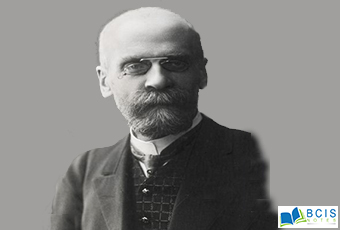
Emile Durkheim(1858- 1917)
Biography on brief:
Emile Durkheim, a renowned French sociologist, erudite scholar, a deep thinker, a progressive educationist, an effective writer, skilled journalist, strict disciplinarian, and voracious reader of the 19th century.
He was born in 1858 in France. He was a very intelligent, innovative, and hard-working student during his academia. He was graduated from the famous college of ‘Paris Ecole Normale’. He received his Ph.D. degree in ‘The Division of Labor in Society’ and worked as a renowned professor in the science of education and sociology.
He launched a research journal named ‘Anne Sociologique’ which is still an academic journal in France. He was highly influenced by the European renaissance and the age of positivism in general and by Auguste Comte in particular.
He was politically liberal who believed in high morality. He studied history, philosophy, psychology, political science, and other literary genres along with natural sciences. With the help of deep study and with sociological critical gaze he produced some academic books. His major publications are:
- The Division of Labor in Society
- The Theory of Suicide
- The Elementary Forms of Religious Life
His book entitled ‘Division of Labors in Society’ has projected bizarre ideas regarding how different divisions of labors are created in order to accomplish the task on time effectively and expertly.
Findings:
Durkheim has projected two major types of social solidarity that prevail and operate in society. They are:
1. Organic Solidarity(Modern):
It is a type of societal solidarity typical of modern industrial society in which unity is based on the interdependence of a very large number of highly specialized roles in a system involving a complex division of labor that requires the cooperation of almost all the groups and individuals of the society.
- The different formal divisions of laborers like doctors, engineers, lawyers, professors, army personnel, police departments, bureaucratic portfolios, and other skill-based division of labors are created in order to accomplish the task on time effectively and expertly.
- In organic solidarity, consensus results from differentiation itself. We are embarking from mechanical solidarity to organic solidarity.
2. Mechanical Solidarity(Primitive):
It is social solidarity based upon homogeneity of values and behavior, strong social constraint, and loyalty to tradition and kinship.
- It is the solidarity of resemblance. Traditional norms, values, usages, social morals, mores, practices, beliefs, sentiments, and strong social capital or bond bind people together.
- It prevails mostly in traditional society. For simple understanding, the ‘Raute’ community governed through mechanical solidarity.
Descriptions about his books:
His book entitled ‘Elementary Forms of Religious Life’ has projected the idea that religion encompasses social glue that binds the people together.
His book entitled ‘Theory of Suicide’ has given platonic views regarding how and why suicide occurs in society. He is the first scholar in order to diagnose the sociological causes behind suicide. It is an indication of the social disorganization of both individuals and society.
According to Emile Durkheim, there are three types of suicide i.e. Anomic, egoistic and altruistic.
Anomic suicide occurs due to the breakdown of social norms and sudden changes. He or she may judge that normless life made their life torture and ruined their social respect. It is characterized by a state of irritation or disgust.
Similarly, egoistic suicide is the product of relatively weak group integration. Egoist persons are aloof and cut off from the mainstream of society. Such persons get alienated and find it difficult to cope with social alienation and feel impelled to commit suicide.
Similarly, altruistic suicide occurs in the form of sacrifice in which is taking off one’s own life for the sake of a cause. If a Muslim boy scarifies his life for the sake of Allah or hara-kiri of Japan, ‘Agni data! are an illustration of altruistic suicide. Man is always ready to sacrifice his life for a great cause, principle, idea, or value.
To be continued and you may also like other similar contents in Sociology.

Leave a Reply